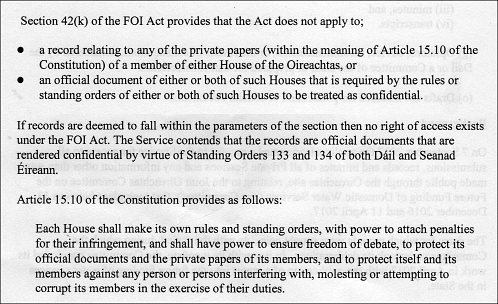by James Quigley
Last month a senior officer from the Office of the Information Commissioner turned down my third and final appeal against the decision to refuse access to all records, not in the public domain, of the Joint Oireachtas Committee on the Future Funding of Domestic Water Services. In all there were some thirty secret sessions of the water Committee held between January to April 2017. It now looks like we will never know what went on behind those closed doors.
The original request was interested in the management of the committee itself, how decisions were finalised and who voted for what. In particular the request highlighted the session of February 15th . In that session the Water Framework Directive and it’s all important 9.4 paragraph that dealt with Ireland’s Water Charges Exemption was discussed at length. For some inexplicable reason, that was the last we heard about the 9.4 Exemption and at the conclusion of the Committee's business in April 2017 there was not a mention of it in any final report.
The Constitution, transparency and accountability
It seems openness, transparency and accountability of Dáil Éireann and it's Committees are hidden in confidentiality and protected by Article 15.10 of the Constitution. The following is a section of the Commissioner’s decision. It can be be read in full HERE:
Section from Commissioners decision.
That’s the bureaucrats but what about those on our side?
I can understand establishment politicians and officials hiding behind bureaucratic excuses. After all we let them do it and keep voting them into office. But you might think that you would get answers from those that were supposedly representing the anti Water Charges side. Sadly in my experience this has not been the case. The R2W leadership and their representatives on that establishment Oireachtas Committee including Sinn Féin, Solidarity, PBP and Independents have not addressed any of the concerns from dejected anti Water Charges campaigners.
Some basic questions that have not been answered are: 1) why there was no mention of the 9.4 Exemption in the report which they applauded on April 6, 2017? 2) why did they accept Irish Water Ltd? 3) why did they accept the principle of charging for excessive and the use of metering?
After repeated inquiries Eoin Ó Broin, Sinn Féin TD, eventually posted this answer on Facebook:
″Sinn Féin and the other Right2Water TDs argued very strongly in the Water Committee for the retention of the exemption contained in the Water Services Directive. Sinn Féin commissioned a Senior Council legal opinion on the issue, tabled the opinion at the Committee and challenged the European Commission on the issue when they came to the committee. Unfortunately as the final report to the committee did not commit to the full abolition of water charges Sinn Féin and the other Right2Water TDs opposed the final report. The Right2Water movement made a formal submission to the Governments River Basin Management Plan consultation which explicitly called on the Government to invoke 9.4 in their revised plan. That is now a matter for the Government which has yet to publish their final plan to be submitted to the European Commission.″
This is such a typical stock political answer. It contains enough truths to make it seem plausible but in substance the answer does not address the the most important question. I have watched the full February debate, well what was available to the public that is, and can safely say that the Senior Counsels, representing both Sinn Féin and Fianna Fáil by the way, indeed made very convincing arguments for the retention of the 9.4 Exemption. So much so that one would have thought the 9.4 argument should have been included in any final report. It was not and it was never even mentioned after February 15th.
I am convinced that the Right2Water representatives did not put up much of an argument themselves and at the end of the day they must not have believed the Senior Counsels themselves because they did not insist that the 9.4 be part of any final report.
See full video: Right2Water TD's at Leinster House claim 'Victory' Apr 5th 2017
https://oireachtas.heanet.ie/mp4/cr4/latest/cr4_20170215.mp4
Clouds of suspicion over omission of 9.4 Exemption in Oireachtas Water Committee report



